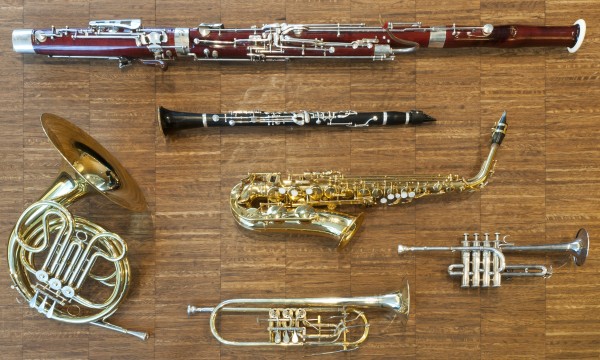Chamber Music Society avoids the usual suspects in wide-ranging wind program

The Chamber Music Society of Lincoln Center threw caution to the winds Friday night in Alice Tully Hall, programming an entire evening of music for instruments you blow into instead of stroke or hit.
All right, a piano sneaked in there once in a while, as pianos will, but when the pianist is the esteemed Gilbert Kalish, who can object? Surely not the mostly-youthful gaggle of wind players with whom he expertly partnered on Friday, when they weren’t blowing up a storm on their own.
This whirlwind tour of Europe—Vienna, Brno, Berlin, and Paris—made stops better known to the players of flutes, oboes, clarinets and bassoons than to the public at large. Missing were chamber standards such as Mozart’s serenades, Poulenc’s Sextet, or Stravinsky’s Octet. In their place were attractive novelties for wind ensemble by Janáček, Mendelssohn, Ibert, Saint-Saëns, and Martinů.
Mozart was represented, too, not by a serenade or divertimento, but by wind arrangements of the overture and arias from Don Giovanni, made by the oboist and composer Johann Georg Triebensee three years after the opera’s 1787 premiere.
It was good to hear Mozart’s great melodies again, and the level of execution by the players—oboists James Austin Smith and Stephen Taylor, clarinetists Romie de Guise-Langlois and Tommaso Lonquich, bassoonists Marc Goldberg and Peter Kolkay, and horn players David Jolley and Eric Reed—was uniformly high. But these pedestrian transcriptions for the 1790 home market hardly merited revival in a latter-day concert hall, especially when compared with the piece that followed.
With a Janáček revival in full swing, this composer’s wind-ensemble masterpiece Mládí is no longer such a novelty, but breathtaking performances of it like the one Friday by flutist Sooyun Kim, oboist Taylor, clarinetists Lonquich and De Guise-Langlois (the latter playing bass clarinet), bassoonist Kolkay and horn player Jolley remain rare.
Mládí means “youth,” and in this four-movement suite the 70-year-old composer seemed indeed like a kid in a candy store, eagerly testing the possible sonorities of six wind instruments, particularly via the technique of doubling, or having two instruments play the same line together, which produces a tone color markedly different from either instrument alone.
In any group of six different instruments, there are 21 possible combinations of two, and Janáček appeared determined to try them all. Add to his sonic imagination his distinctive Czech-derived harmonies and syntax, and you have a musical idiom unsurpassed for freshness and local color.
The players artfully delivered the first movement’s jerky starts and stops, the second movement’s mood teetering on a typically Janáčekian knife edge between sad and animated, the crisp children’s march and tender interludes of the third movement, and a lustier march with nostalgic episodes to close the work.
Their teamwork was so seamless that it’s hard to single out this or that player for praise. However, it should be noted that every time flutist Kim reached for her piccolo, something delicious was in store.
After intermission, the program concluded with four shorter and less memorable pieces. Anything by Mendelssohn, of course, is quality goods, and if his Concertpiece No. 2 in D minor for Clarinet, Basset Horn and Piano, composed for a father-son duo of clarinet virtuosos, wasn’t his profoundest effort, it still was touched by his seemingly endless felicity of invention and gift for heart-tugging melody, and at nine minutes long it didn’t overstay its welcome.
Pianist Kalish mostly plunked along quietly as Lonquich and De Guise-Langlois tore into the dazzling passagework and soared on wings of song. De Guise-Langlois thus completed a trifecta of the clarinet family, having performed earlier on the standard clarinet and the bass clarinet, and now dusting off the rarely-heard basset horn, a type of clarinet pitched between the other two.
Jacques Ibert’s Three Short Pieces was the only work on the program for the classic woodwind quintet of flute, oboe, clarinet, bassoon and horn, and not surprisingly this group of players (Kim, Taylor, Lonquich, Goldberg and Reed) locked into a balance and blend that eluded the evening’s less conventional wind groupings.
This piece didn’t tarry long, either, neatly delivering a brightly-scored jig, a sensitive duo for just the flute and clarinet, and a wayward little finale in dollhouse-size sonata form. Like some French wines, it tasted good going down, but left little aftertaste.
Camille Saint-Saëns, like Mendelssohn, was a serious composer whose party pieces (such as Carnival of the Animals) were not to be underestimated. His Tarantelle in A minor for Flute, Clarinet and Piano, composed for a soirée at Rossini’s house, cunningly built up a whirling tarantella dance in the manner of Liszt, then swung into a tune catchier than anything Liszt ever wrote. Kim and De Guise-Langlois fired off the rapid staccato dialogue and racing runs, while pianist Kalish occasionally got a phrase in edgewise.
In contrast, Kalish’s piano often led the way in Bohuslav Martinů’s jazz-colored Sextet for Flute, Oboe, Clarinet, Two Bassoons and Piano, composed in Paris in 1929. Kalish swung lightly in the first movement’s Czecho-Franco-ragtime, dialogued with smooth winds in the Adagio, led flutist Kim on a merry chase in the Scherzo, slithered chromatically à la Gershwin in the Blues, and pounded out a stride beat in the funny, frenetic Finale.
Martinů’s wind parts sounded disappointingly monochromatic and too often bunched together in an organ-like sound, but that was not the fault of players Kim, Smith, Lonquich, Kolkay, and Goldberg, who performed stylishly and with grace throughout.
The next presentation of the Chamber Music Society of Lincoln Center will be music by Chinese composers 6:30 p.m. and 9 p.m. Thursday at the Rose Studio. chambermusicsociety.org; 212-875-5788.


